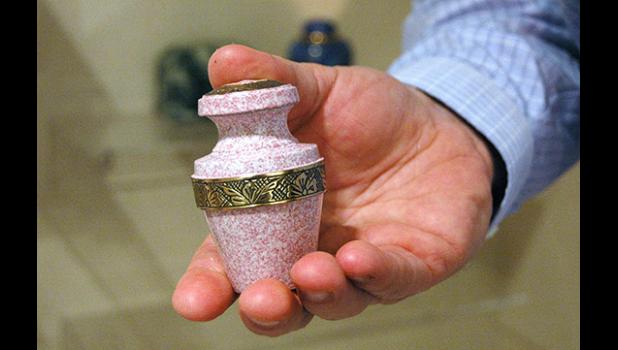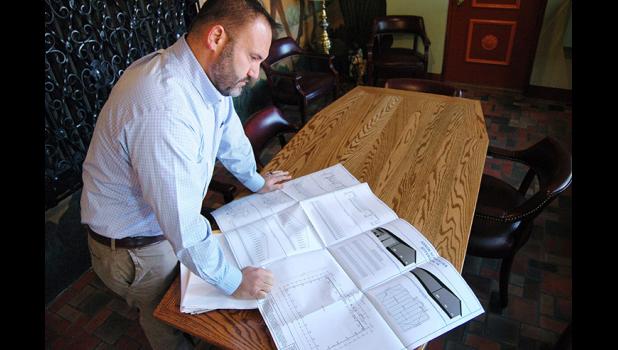SPREADING OUT
By ANDREW MCGINN
The reality of small-town living is that there are a number of things you have to leave Greene County to buy or do.
You can no longer buy running shoes, a baseball glove, a dirt bike for your kid, a man’s suit, a copy of John Grisham’s new novel or the latest “Red Dead Redemption” video game for PS4 (or a PS4, for that matter).
If you receive a terrifying notice that your car’s airbag could explode with shrapnel upon impact, you have to leave the county to have it serviced — and the same goes for something as simple as needing a haircut on a Sunday.
But beginning next year, you won’t have to leave Greene County to be cremated.
Seeing that cremations are now outpacing burials nationally, local funeral director Aaron Schroeder will be investing in a crematory of his own, to be built just to the south of a new veterinary clinic under construction on Gallup Road.
“It’s a hefty investment,” Schroeder explained, “and I wanted to make sure it was the right thing to do at the right time.”
Dirt work on the site, near Jefferson’s Super 8, is expected to begin soon.
When the Slininger-Schroeder Funeral Home’s standalone crematory is complete, it will mark the most dramatic advancement in the funeral business locally — a business we’ll all be customers of, sooner or later — in a century, when “undertaking” was still its own department in L.C. Wright’s Jefferson furniture store.
In 1919, Clyde Slininger had the foresight to start a business devoted exclusively to undertaking.
Schroeder, a 1993 graduate of Jefferson-Scranton High School and an Army veteran, is the fourth person to own that business, which can rightfully boast continuous service since 1919.
In the 10 years since Schroeder bought the funeral home from mentor Mark Rossow, the number of people choosing cremation has already jumped from 10 percent to 40 percent.
“It’s only going to keep creeping up,” Schroeder said.
It’s only a matter of time, in fact, before cremation overtakes traditional burial in popularity everywhere, including rural Iowa, where trends are slower to arrive. Schroeder owns a funeral home in Boone as well.
Nationally, cremation exceeded burial for the first time in 2015, with a cremation rate of 47.9 percent that year and a burial rate of 45.2 percent, according to data from the National Funeral Directors Association.
The association is projecting a cremation rate this year of 53.5 percent.
And by 2035, only 15 percent of families will choose traditional burial, the association predicts. Most everyone else (79.1 percent) will be cremated.
The surge in the popularity of cremation has required Schroeder and his staff to make repeat trips to Ames to use the services of a crematory there.
“It’s important for me to give families peace of mind that their loved one is in our continual care,” Schroeder said.
About 30 percent of funeral homes nationwide now operate their own crematories, according to the National Funeral Directors Association.
Schroeder said a crematory needs to do 50-60 cremations annually to break even — and that’s right where he’s currently at between his two funeral homes.
He also expects to pick up business from other funeral homes that don’t have their own crematories. Schroeder said there’s no crematory yet in neighboring Carroll County, a county with more than double Greene County’s population.
Cremation is trending upward for a few reasons, from its lower cost to the simple fact that families are farther apart than at anytime before.
“People are so spread out now,” Schroeder said. “It’s more of a convenience thing.”
Cremating a loved one, he said, enables a family with members in multiple states to delay a service for months, if necessary.
Religious rules concerning cremation have also loosened.
“For a long time,” Schroeder said, “it wasn’t accepted in some of the churches.”
Cremation in the Catholic Church, in particular, was specifically forbidden until 1963.
The early Christians considered cremation the stuff of pagans, a view that held well into the mid-20th century. In 1960, only 3.6 percent of people in the U.S. chose cremation over burial.
The Vatican still hasn’t entirely endorsed cremation — preferring burial in the manner of Christ — but it’s now permitted. However, Catholics are still forbidden from scattering ashes or keeping them at home.
As everyday life becomes increasingly more informal, though, people are honoring their dead in ways that match — ways that presumably would have been unthinkable 50 or 60 years ago, when the only T-shirt a man ever wore was underneath his button-down shirt.
Consider, for example, the cookie jars Schroeder has used as urns at the request of families.
“It’s really about personalization,” he said.
It will take two months for Schroeder’s cremator to be custom built once he orders it, and it will weigh 25,000 pounds, he said.
A typical cremator burns at a temperature of 1,400 to 1,600 degrees, reducing a body to bone fragments over the course of two or more hours. Those bone fragments are then reduced to four to six pounds of remains.
Because Schroeder’s cremator is new, it will be more efficient, he said, automatically closing down the gas if it gets too hot.
“There’s less emissions from a crematory,” Schroeder said, “than burning leaves in your backyard.”
Cremation is seen as more environmentally friendly than embalming, but it’s not actually the greenest option for a body after death.
A “green cremation” — known as alkaline hydrolysis — puts no carbon into the atmosphere.
While still not legal in every state, the procedure uses water and an alkali solution, rather than flame, to dissolve a body inside a stainless steel chamber.
The result?
Something safe enough to be poured straight down the drain.
At this rate, though, that’s something for the fifth or sixth owner of Clyde Slininger’s funeral home to contend with.
- Log in to post comments



